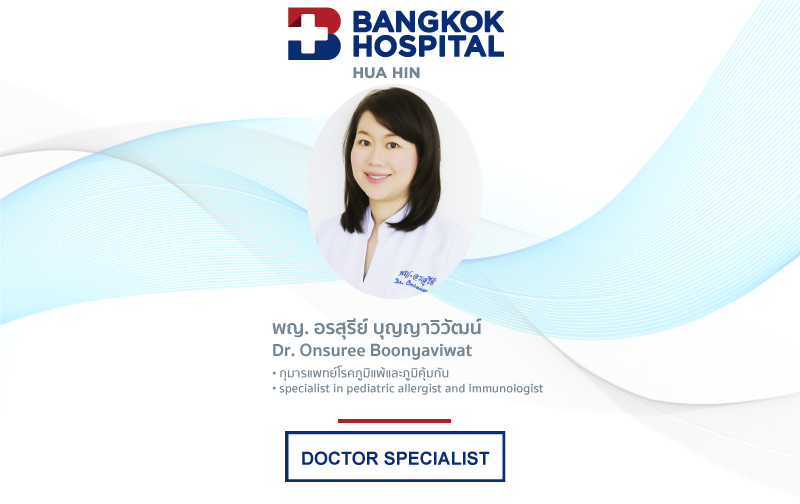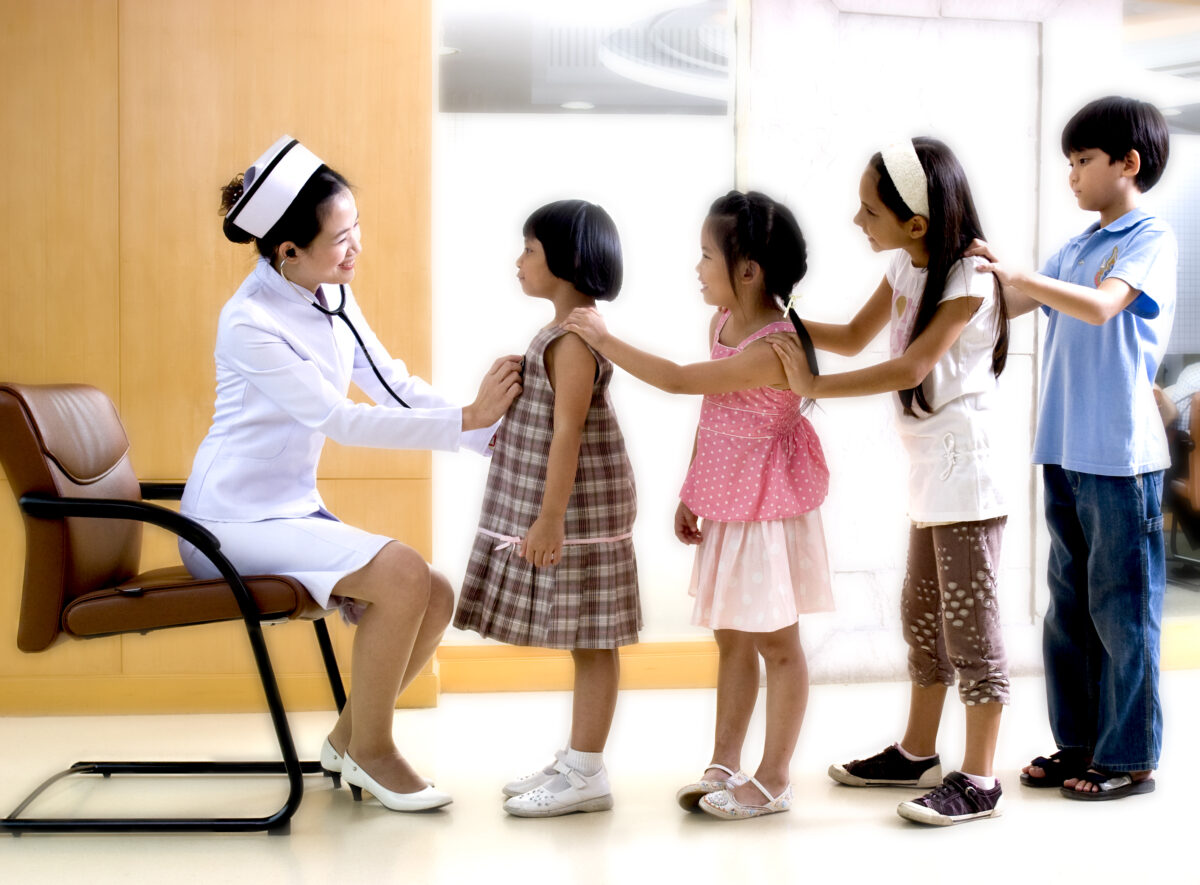Allergy in children can be prevented
 Dr. Onsuree Boonyaviwat, our pediatric allergy and immunology specialist at Bangkok Hospital Hua Hin, shares that the parents may notice abnormal symptoms in their children such as frequent or chronic cold symptoms . The symptoms may be more prominent at certain times such as runny nose at night time or at dawns. Some children have more coughs after exercises or when the weather changes or after having a cold. For skin allergies, it may happen intermittently or after eating certain food such as cow milk, eggs, seafood and peanuts. Skin allergies may happen from contacting allergens such as dust or pets. Children with suspicious allergies should have a consultation with a doctor.
Dr. Onsuree Boonyaviwat, our pediatric allergy and immunology specialist at Bangkok Hospital Hua Hin, shares that the parents may notice abnormal symptoms in their children such as frequent or chronic cold symptoms . The symptoms may be more prominent at certain times such as runny nose at night time or at dawns. Some children have more coughs after exercises or when the weather changes or after having a cold. For skin allergies, it may happen intermittently or after eating certain food such as cow milk, eggs, seafood and peanuts. Skin allergies may happen from contacting allergens such as dust or pets. Children with suspicious allergies should have a consultation with a doctor.
 Allergies may be genetic-related or caused by external factors. If one of the parents has allergic diseases, the chance that children may also have allergies is 30 – 50 percent and when both of the parents have allergies, the chance will increase to 50 – 70 per cent. The chance is only 10 % when none of the parents have allergies. Currently, there is nothing we can do with the genetics, the avoidance of allergens such as cigarette smoke and dust can reduce the symptoms of the disease or prevent the allergies.
For allergic rhinitis, patients often have nasal congestion with difficulties of breathing leading to a lack of sleep causing drowsiness during the day with a lack of energy, poor memory or concentration which can affect learning and working abilities In children, it will affect growth and also the personality and the quality of life. Furthermore, in the case of asthma, patients may have severe asthmatic symptoms which can be very serious and life threatening as well as the case of severe food allergies. .
The treatment principle for allergies is to control the environment and allergens. Most of allergic patients in Thailand have an allergy against dust mites, cockroaches, pollens and animal hair are also very common. The doctor will recommend all patients to receive an examination called skin test to identify what the patients are allergic to. The information is used to produce desensitization injection as a form of treatment too.
Another allergy treatment is medication. For an easy understanding, we will separate the treatment of allergies into 2 levels;
reathing leading to a lack of sleep causing drowsiness during the day with a lack of energy, poor memory or concentration which can affect learning and working abilities In children, it will affect growth and also the personality and the quality of life. Furthermore, in the case of asthma, patients may have severe asthmatic symptoms which can be very serious and life threatening as well as the case of severe food allergies. .
1. Medications to relieve symptoms such as antihistamines and bronchodilators, anti-inflammatory drugs such as steroid nasal sprays or oral inhalers.
2. Allergy vaccines or desensitization is a treatment by injecting allergens that the patient is allergic to into the body by starting from small amounts and increasing until the body becomes used to that allergen. The patients who should be treated with an allergy vaccination are ones who have been treated with drugs without improvement or suffering from side effects of the drugs. Before choosing a treatment by vaccination, the doctor needs to know what the patients are allergic to prepare the vaccine. This treatment should be made by a specialist and patients must undergo continuous treatment for at least 3 – 5 years.
Allergies may be genetic-related or caused by external factors. If one of the parents has allergic diseases, the chance that children may also have allergies is 30 – 50 percent and when both of the parents have allergies, the chance will increase to 50 – 70 per cent. The chance is only 10 % when none of the parents have allergies. Currently, there is nothing we can do with the genetics, the avoidance of allergens such as cigarette smoke and dust can reduce the symptoms of the disease or prevent the allergies.
For allergic rhinitis, patients often have nasal congestion with difficulties of breathing leading to a lack of sleep causing drowsiness during the day with a lack of energy, poor memory or concentration which can affect learning and working abilities In children, it will affect growth and also the personality and the quality of life. Furthermore, in the case of asthma, patients may have severe asthmatic symptoms which can be very serious and life threatening as well as the case of severe food allergies. .
The treatment principle for allergies is to control the environment and allergens. Most of allergic patients in Thailand have an allergy against dust mites, cockroaches, pollens and animal hair are also very common. The doctor will recommend all patients to receive an examination called skin test to identify what the patients are allergic to. The information is used to produce desensitization injection as a form of treatment too.
Another allergy treatment is medication. For an easy understanding, we will separate the treatment of allergies into 2 levels;
reathing leading to a lack of sleep causing drowsiness during the day with a lack of energy, poor memory or concentration which can affect learning and working abilities In children, it will affect growth and also the personality and the quality of life. Furthermore, in the case of asthma, patients may have severe asthmatic symptoms which can be very serious and life threatening as well as the case of severe food allergies. .
1. Medications to relieve symptoms such as antihistamines and bronchodilators, anti-inflammatory drugs such as steroid nasal sprays or oral inhalers.
2. Allergy vaccines or desensitization is a treatment by injecting allergens that the patient is allergic to into the body by starting from small amounts and increasing until the body becomes used to that allergen. The patients who should be treated with an allergy vaccination are ones who have been treated with drugs without improvement or suffering from side effects of the drugs. Before choosing a treatment by vaccination, the doctor needs to know what the patients are allergic to prepare the vaccine. This treatment should be made by a specialist and patients must undergo continuous treatment for at least 3 – 5 years.
 Dr. Onsuree also shares that the most important for self – caring when having allergies is to avoid those allergens, use the medicine as recommended and maintain good sleep and regularly exercise. If patient has severe symptoms or medication does not seem to work, they may have to consult the specialist sooner than expected. The treatments are individualized as there may be some complications during the treatments.
*********************************************************************************
For more information, please contact :
Pediatric Clinic, Bangkok Hospital Hua Hin, 3rd floor Tel. 032-616-883
Dr. Onsuree also shares that the most important for self – caring when having allergies is to avoid those allergens, use the medicine as recommended and maintain good sleep and regularly exercise. If patient has severe symptoms or medication does not seem to work, they may have to consult the specialist sooner than expected. The treatments are individualized as there may be some complications during the treatments.
*********************************************************************************
For more information, please contact :
Pediatric Clinic, Bangkok Hospital Hua Hin, 3rd floor Tel. 032-616-883